Charles E W Bean, Diaries, AWM38 3DRL 606/245/1 - 1915 - 1925 - Part 5
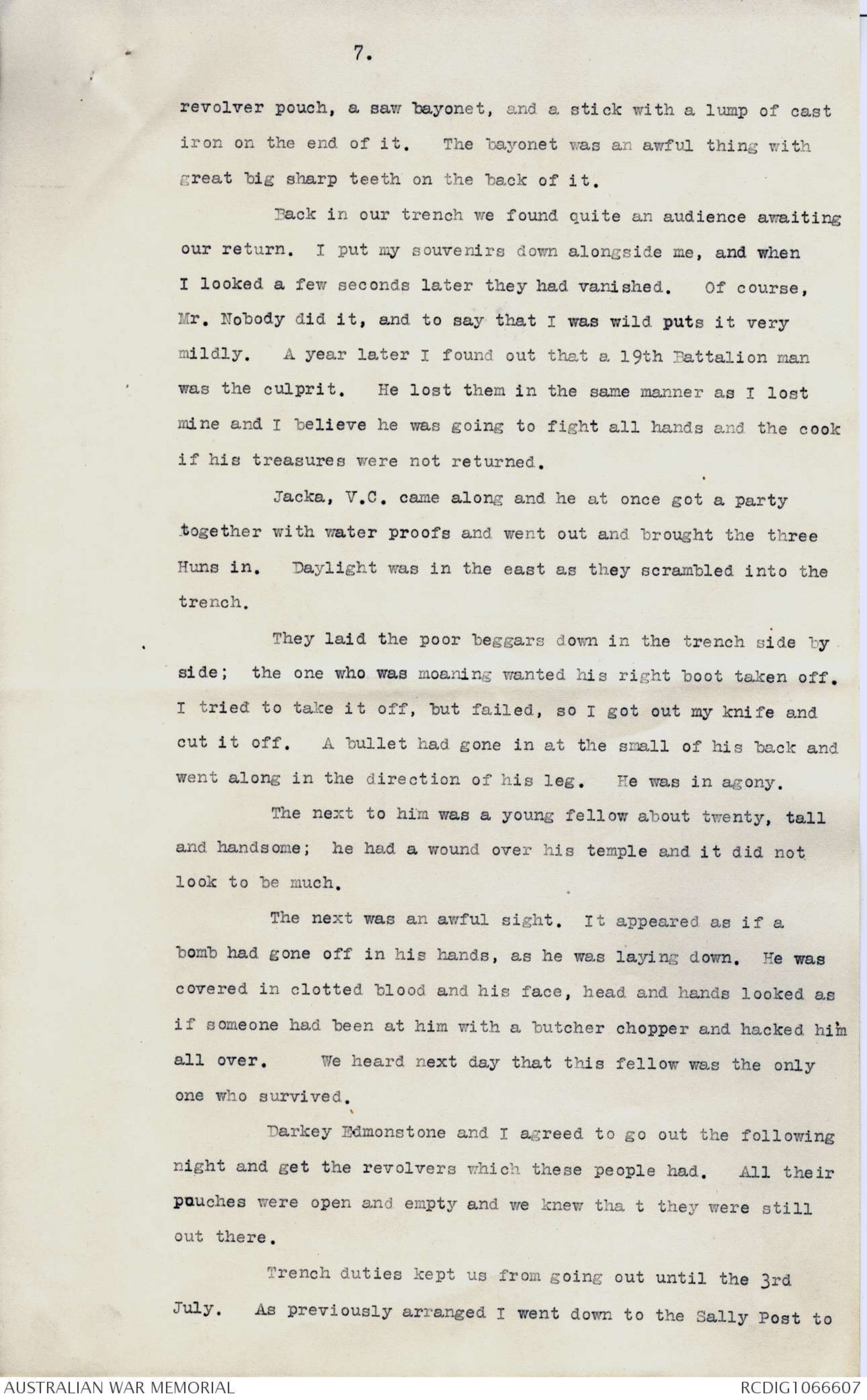
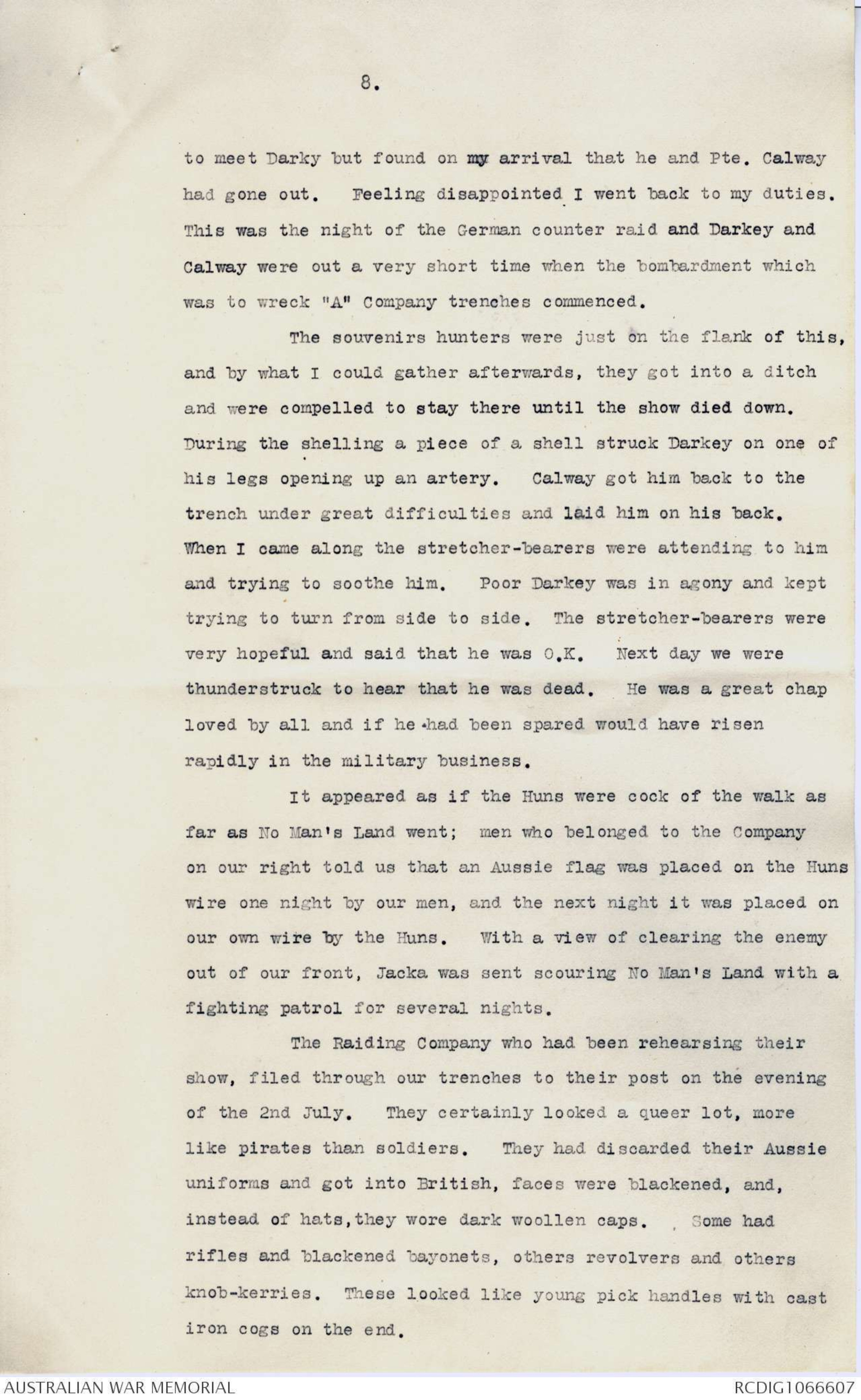
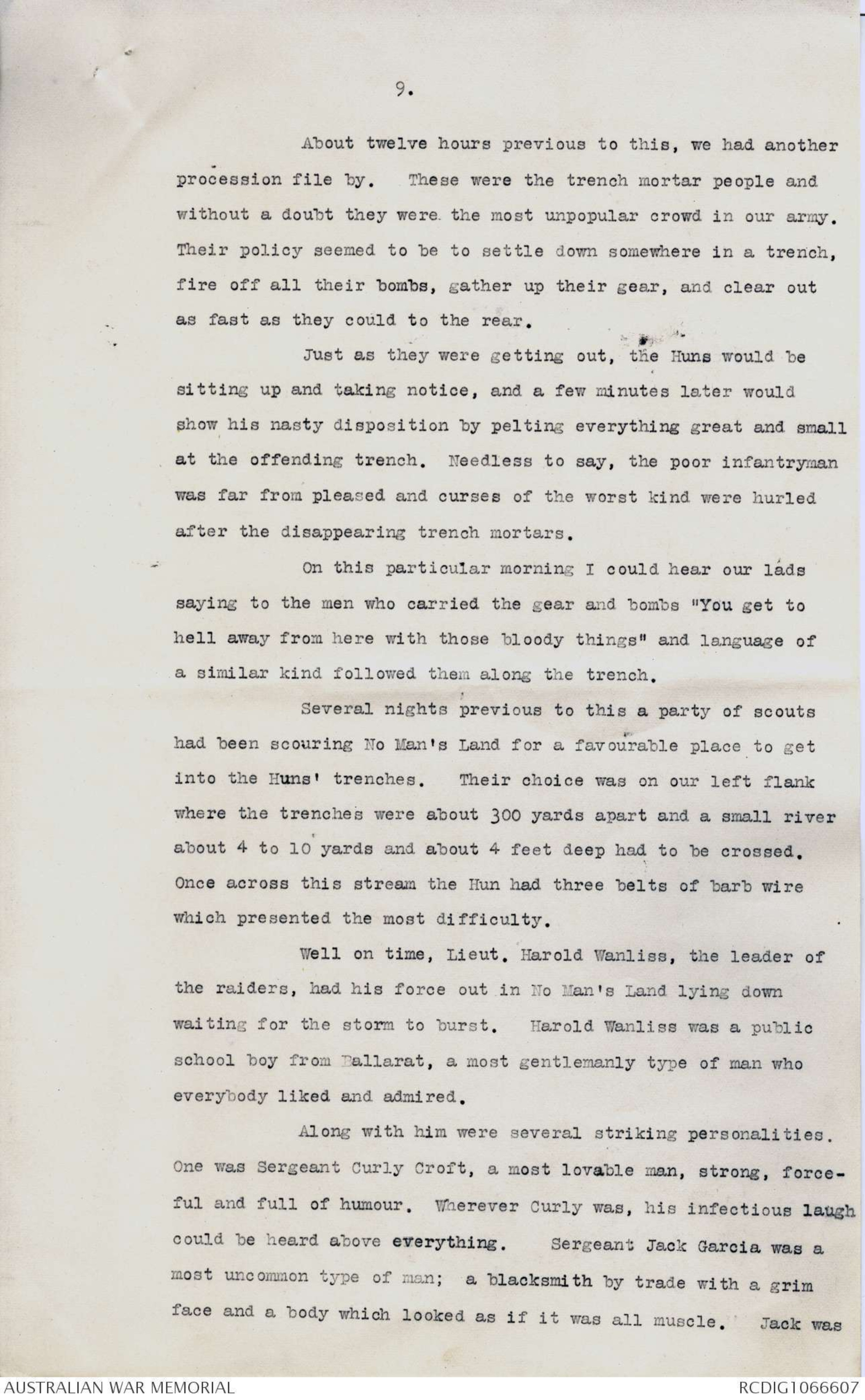
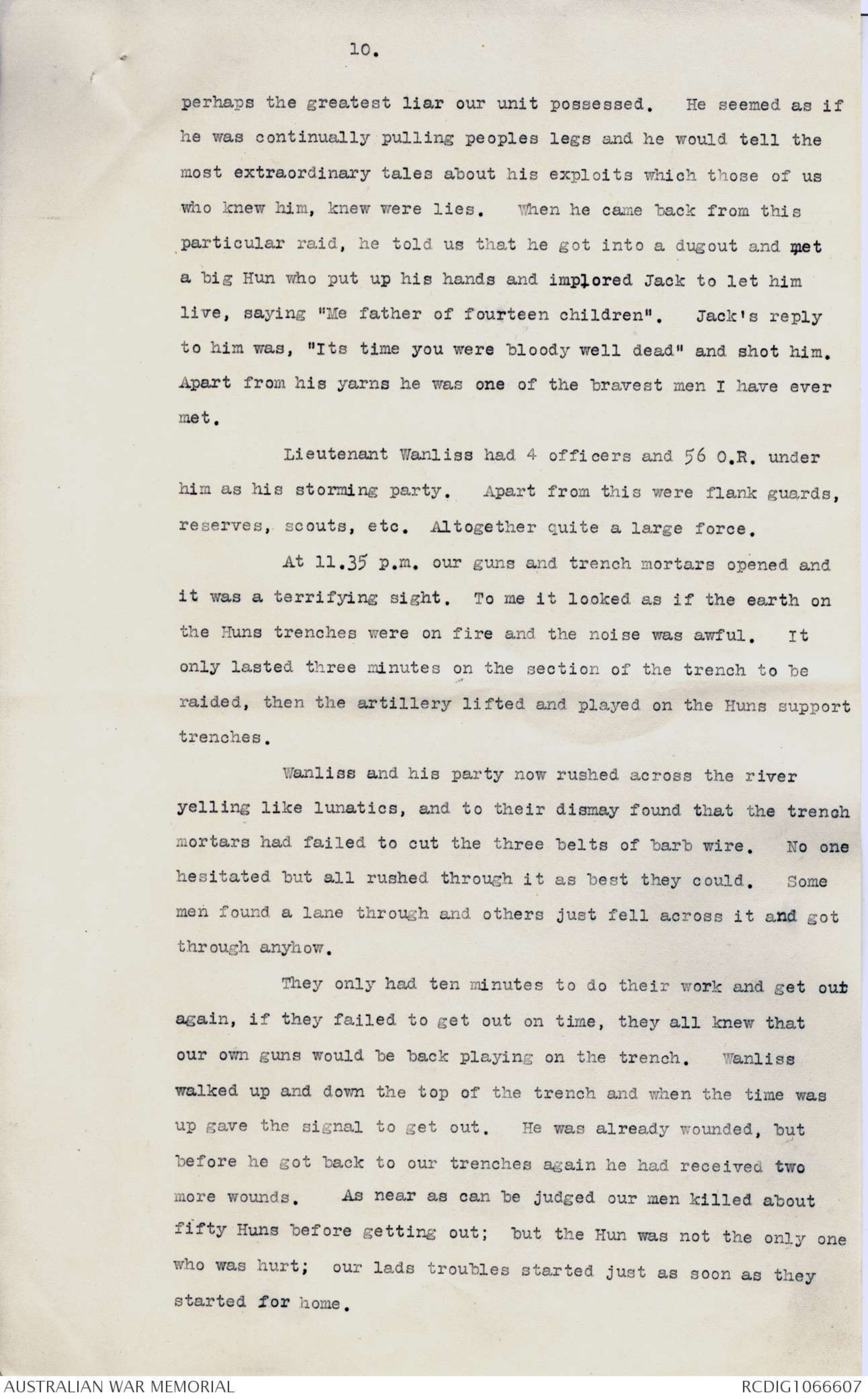
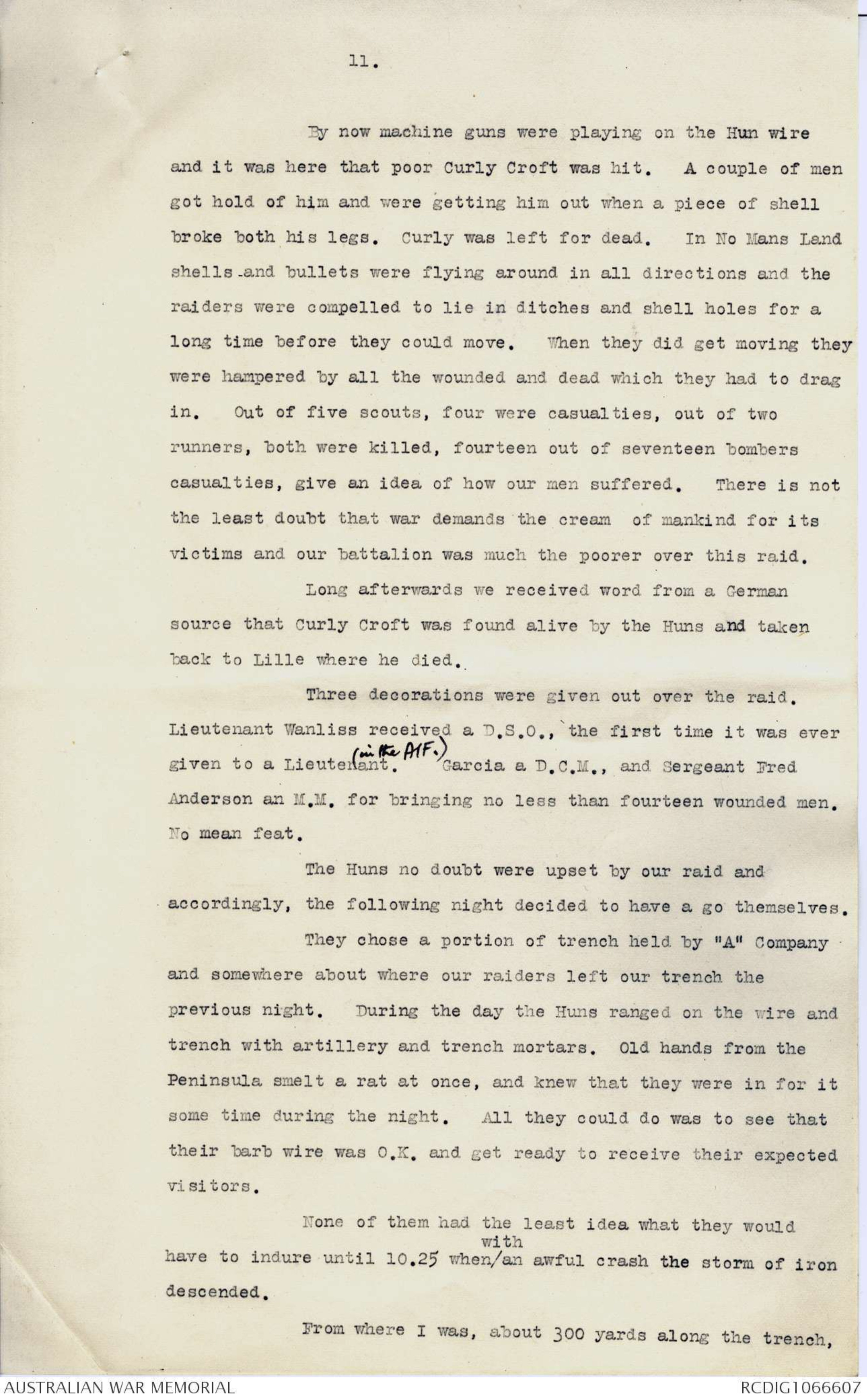
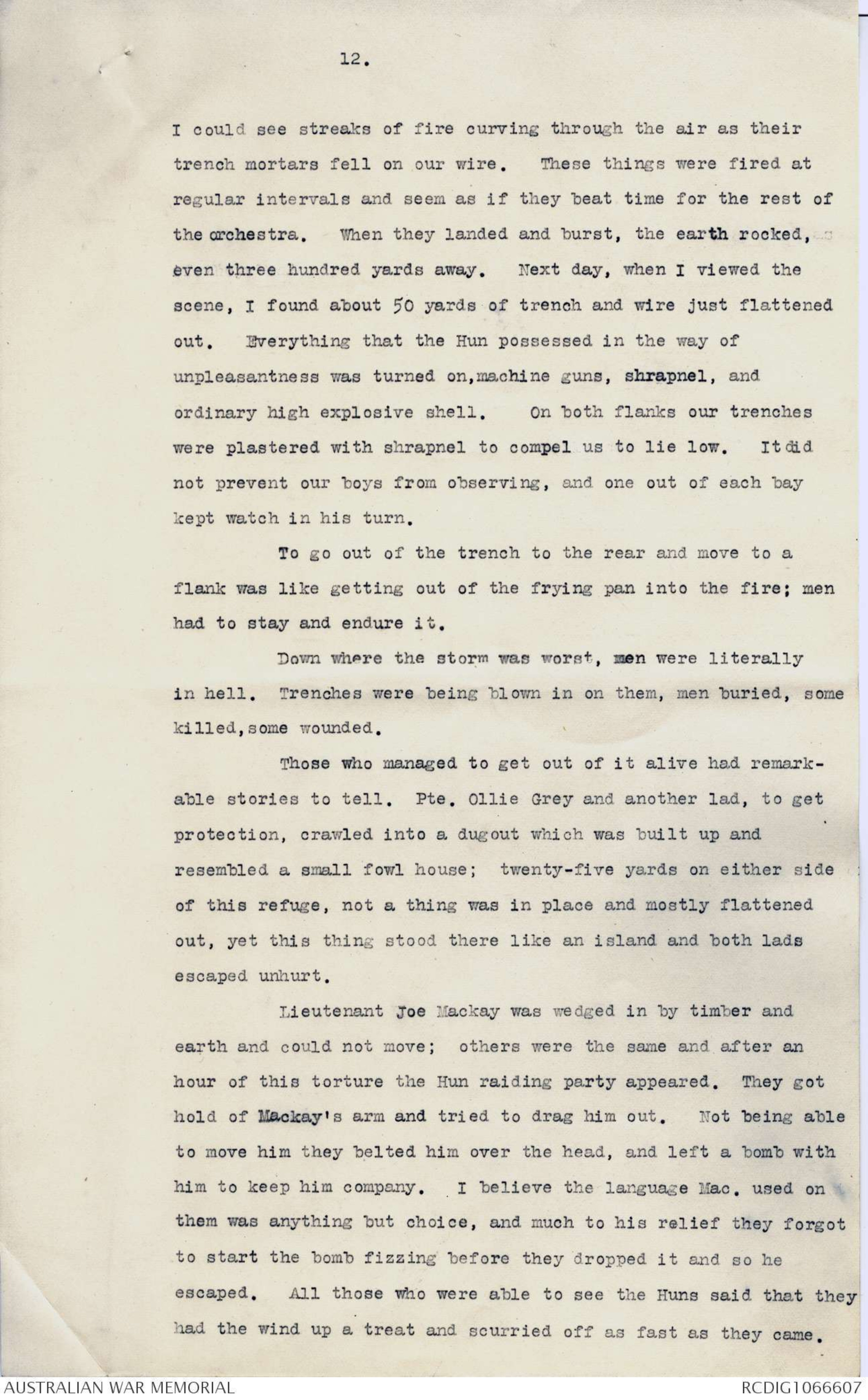
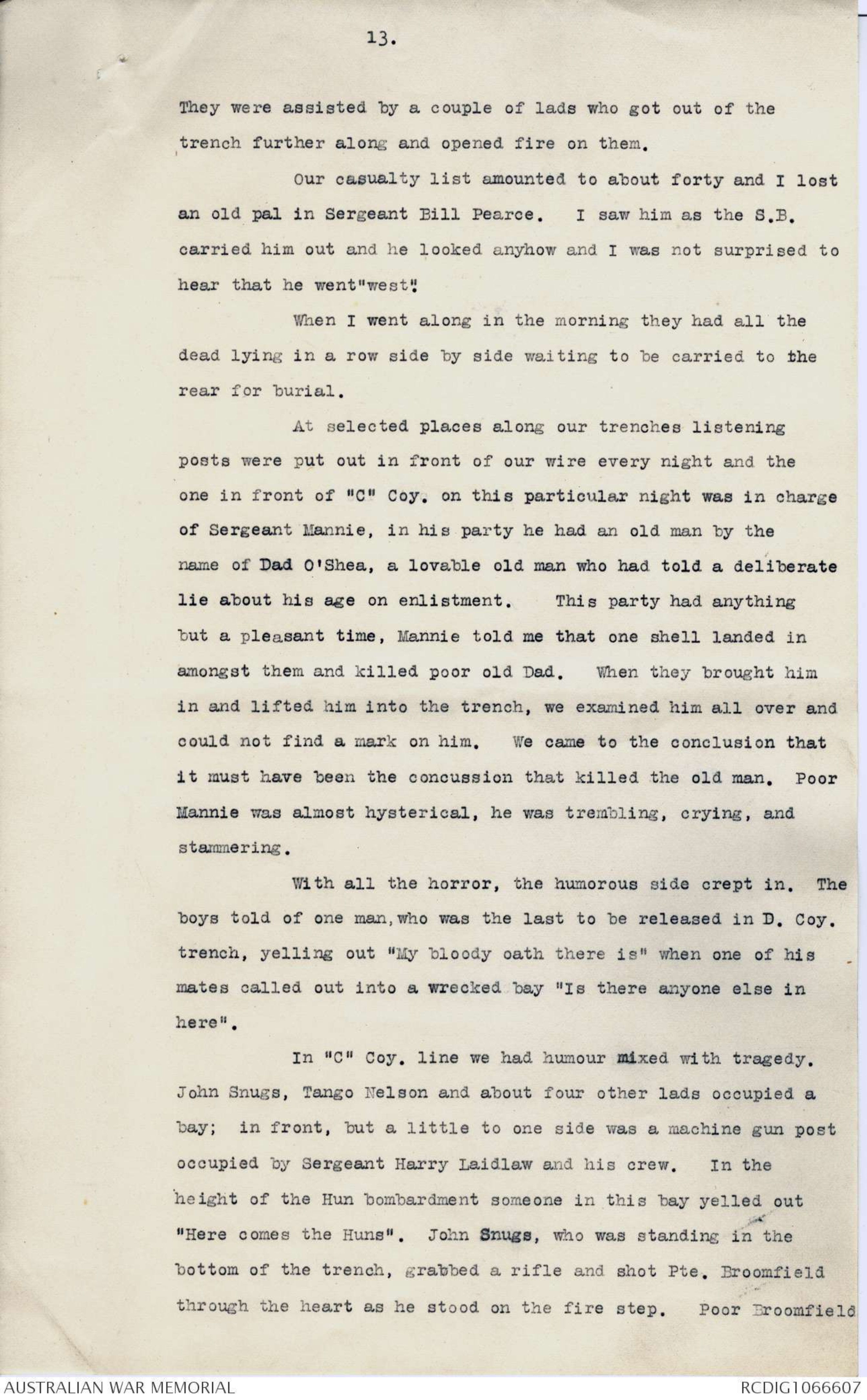
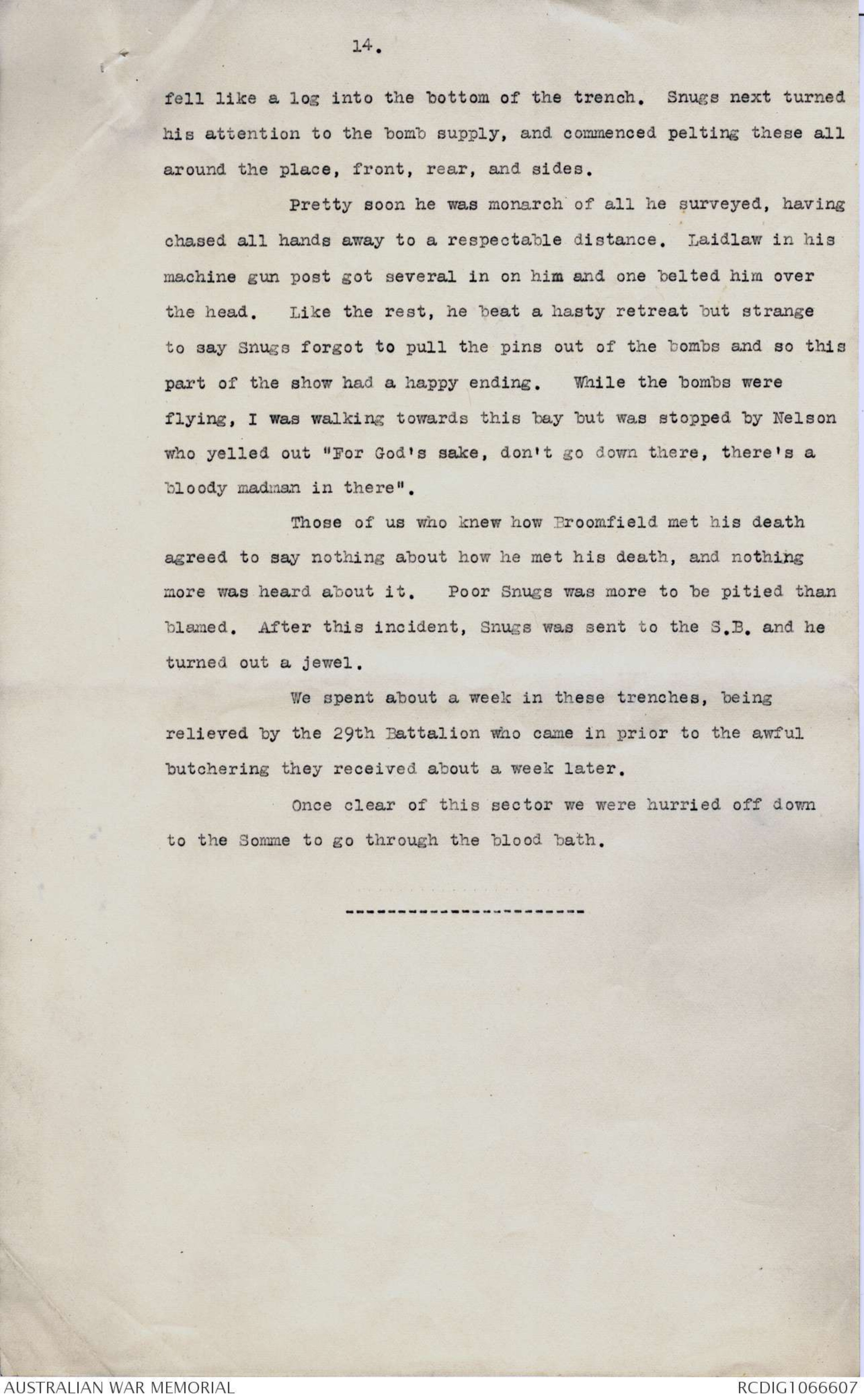
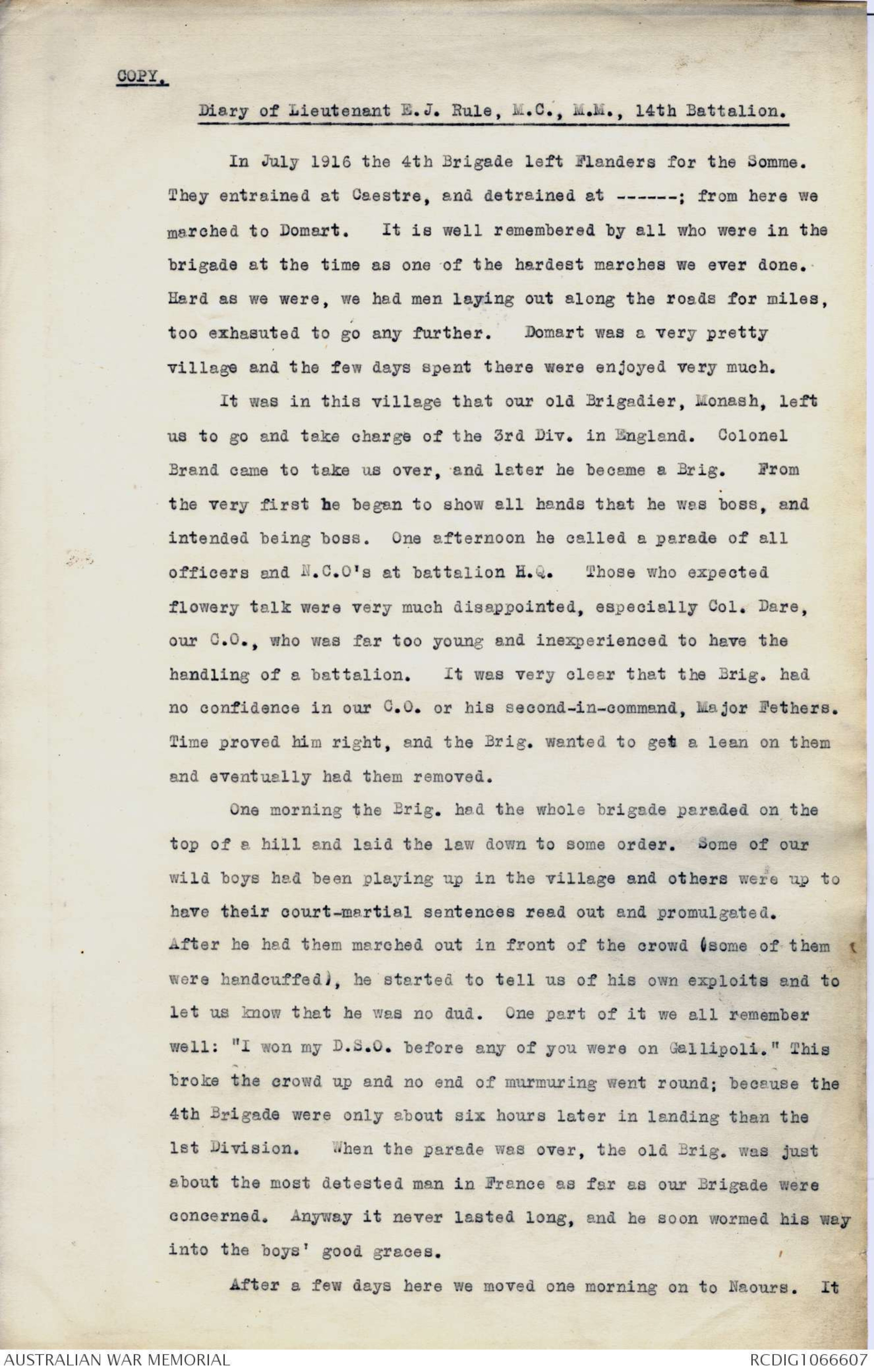
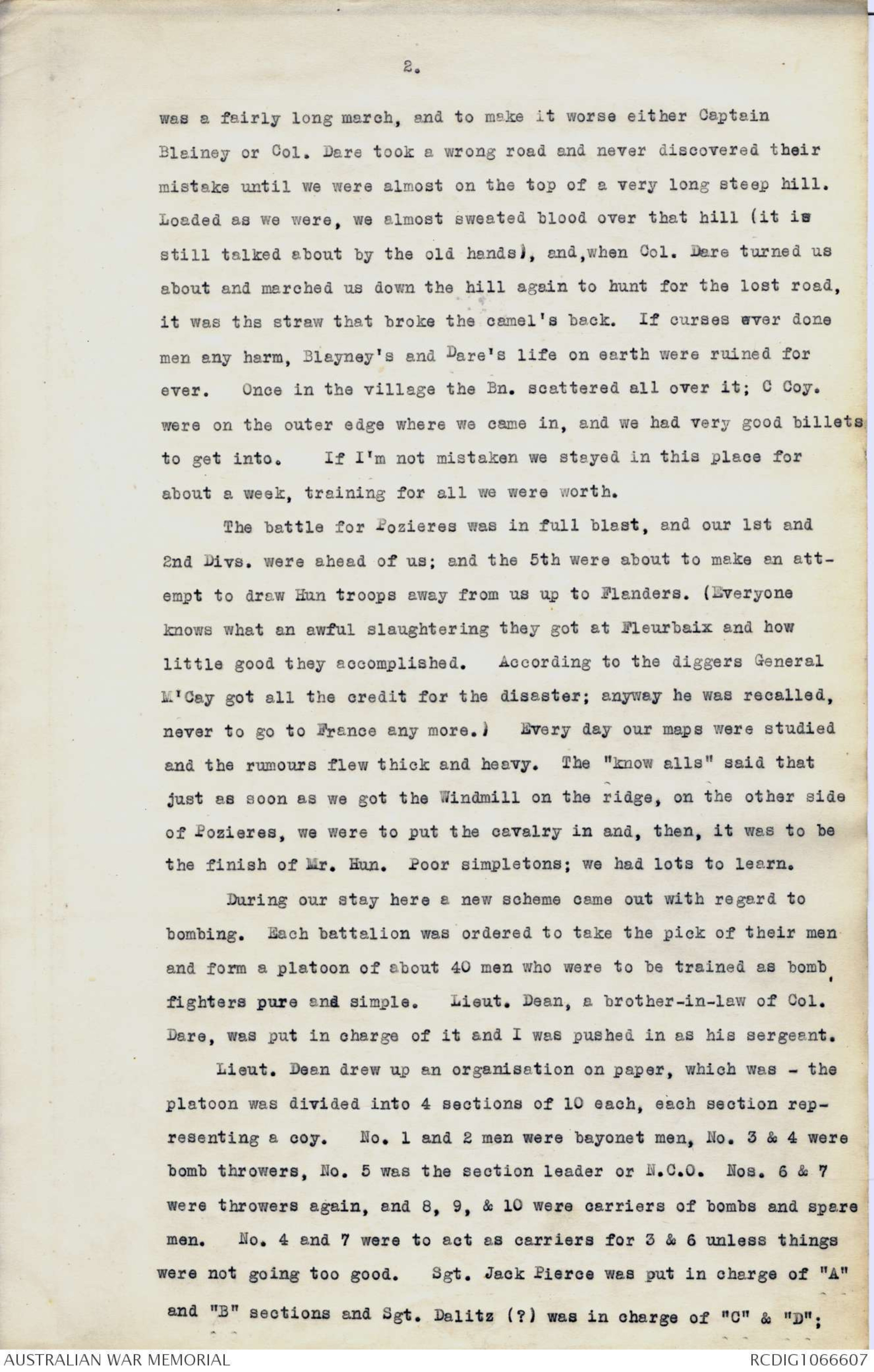
7.
revolver pouch, a saw bayonet, and a stick with a lump of cast
iron on the end of it. The bayonet was an awful thing with
great big sharp teeth on the back of it.
Back in our trench we found quite an audience awaiting
our return. I put my souvenirs down alongside me, and when
I looked a few seconds later they had vanished. Of course,
Mr. Nobody did it, and to say that I was wild puts it very
mildly. A year later I found out that a 19th Battalion man
was the culprit. He lost them in the same manner as I lost
mine and I believe he was going to fight all hands and the cook
if his treasures were not returned.
Jacka, V.C. came along and he at once got a party
together with water proofs and went out and brought the three
Huns in. Daylight was in the east as they scrambled into the
trench.
They laid the poor beggars down in the trench side by
side; the one who was moaning wanted his right boot taken off,
I tried to take it off, but failed, so I got out my knife and
cut it off. A bullet had gone in at the small of his back and
went along in the direction of his leg. He was in agony.
The next to him was a young fellow about twenty, tall
and handsome; he had a wound over his temple and it did not
look to be much.
The next was an awful sight. It appeared as if a
bomb had gone off in his hands, as he was laying down. He was
covered in clotted blood and his face, head and hands looked as
if someone had been at him with a butcher chopper and hacked him
all over. We heard next day that this fellow was the only
one who survived.
Darkey Edmonstone and I agreed to go out the following
night and get the revolvers which these people had. All their
pouches were open and empty and we knew that they were still
out there.
Trench duties kept us from going out until the 3rd
July. As previously arranged I went down to the Sally Post to
8.
to meet Darky but found on my arrival that he and Pte. Calway
had gone out. Feeling disappointed I went back to my duties.
This was the night of the German counter raid and Darkey and
Calway were out a very short time when the bombardment which
was to wreck "A" Company trenches commenced.
The souvenirs hunters were just on the flank of this,
and by what I could gather afterwards, they got into a ditch
and were compelled to stay there until the show died down.
During the shelling a piece of a shell struck Darkey on one of
his legs opening up an artery. Calway got him back to the
trench under great difficulties and laid him on his back.
When I came along the stretcher-bearers were attending to him
and trying to soothe him. Poor Darkey was in agony and kept
trying to turn from side to side. The stretcher-bearers were
very hopeful and said that he was O.K. Next day we were
thunderstruck to hear that he was dead. He was a great chap
loved by all and if he had been spared would have risen
rapidly in the military business.
It appeared as if the Huns were cock of the walk as
far as No Man's Land went; men who belonged to the Company
on our right told us that an Aussie flag was placed on the Huns
wire one night by our men, and the next night it was placed on
our own wire by the Huns. With a view of clearing the enemy
out of our front, Jacka was sent scouring No Man's Land with a
fighting patrol for several nights.
The Raiding Company who had been rehearsing their
show, filed through our trenches to their post on the evening
of the 2nd July. They certainly looked a queer lot, more
like pirates than soldiers. They had discarded their Aussie
uniforms and got into British, faces were blackened, and,
instead of hats, they wore dark woollen caps. Some had
rifles and blackened bayonets, others revolvers and others
knob-kerries. These looked like young pick handles with cast
iron cogs on the end.
9.
About twelve hours previous to this, we had another
procession file by. These were the trench mortar people and
without a doubt they were the most unpopular crowd in our army.
Their policy seemed to be to settle down somewhere in a trench,
fire off all their bombs, gather up their gear, and clear out
as fast as they could to the rear.
Just as they were getting out, the Huns would be
sitting up and taking notice, and a few minutes later would
show his nasty disposition by pelting everything great and small
at the offending trench. Needless to say, the poor infantryman
was far from pleased and curses of the worst kind were hurled
after the disappearing trench mortars.
On this particular morning I could hear our lads
saying to the men who carried the gear and bombs "You get to
hell away from here with those bloody things" and language of
a similar kind followed them along the trench.
Several nights previous to this a party of scouts
had been scouring No Man's Land for a favorable place to get
into the Huns' trenches. Their choice was on our left flank
where the trenches were about 300 yards apart and a small river
about 4 to 10 yards and about 4 feet deep had to be crossed.
Once across this stream the Hun had three belts of barb wire
which presented the most difficulty.
Well on time, Lieut. Harold Wanliss, the leader of
the raiders, had his force out in No Man's Land lying down
waiting for the storm to burst. Harold Wanliss was a public
school boy from Ballarat, a most gentlemanly type of man who
everybody liked and admired.
Along with him were several striking personalities.
One was Sergeant Curly Croft, a most lovable man, strong, forceful
and full of humour. Wherever Curly was, his infectious laugh
could be heard above everything. Sergeant Jack Garcia was a
most uncommon type of man; a blacksmith by trade with a grim
face and a body which looked as if it was all muscle. Jack was
10.
perhaps the greatest liar our unit possessed. He seemed as if
he was continually pulling peoples legs and he would tell the
most extraordinary tales about his exploits which those of us
who knew him, knew were lies. When he came back from this
particular raid, he told us that he got into a dugout and met
a big Hun who put up his hands and implored Jack to let him
live, saying "Me father of fourteen children". Jack's reply
to him was, "Its time you were bloody well dead" and shot him.
Apart from his yarns he was one of the bravest men I have ever
met.
Lieutenant Wanliss had 4 officers and 56 O.R. under
him as his storming party. Apart from this were flank guards,
reserves, scouts, etc. Altogether quite a large force.
At 11.35 p.m. our guns and trench mortars opened and
it was a terrifying sight. To me it looked as if the earth on
the Huns trenches were on fire and the noise was awful. It
only lasted three minutes on the section of the trench to be
raided, then the artillery lifted and played on the Huns support
trenches.
Wanliss and his party now rushed across the river
yelling like lunatics, and to their dismay found that the trench
mortars had failed to cut the three belts of barb wire. No one
hesitated but all rushed through it as best they could. Some
men found a lane through and others just fell across it and got
through anyhow.
They only had ten minutes to do their work and get out
again, if they failed to get out on time, they all knew that
our own guns would be back playing on the trench. Wanliss
walked up and down the top of the trench and when the time was
up gave the signal to get out. He was already wounded, but
before he got back to our trenches again he had received two
more wounds. As near as can be judged our men killed about
fifty Huns before getting out; but the Hun was not the only one
who was hurt; our lads troubles started just as soon as they
started for home.
11.
By now machine guns were playing on the Hun wire
and it was here that poor Curly Croft was hit. A couple of men
got hold of him and were getting him out when a piece of shell
broke both his legs. Curly was left for dead. In No Mans Land
shells and bullets were flying around in all directions and the
raiders were compelled to lie in ditches and shell holes for a
long time before they could move. When they did get moving they
were hampered by all the wounded and dead which they had to drag
in. Out of five scouts, four were casualties, out of two
runners, both were killed, fourteen out of seventeen bombers
casualties, give an idea of how our men suffered. There is not
the least doubt that war demands the cream of mankind for its
victims and our battalion was much the poorer over this raid.
Long afterwards we received word from a German
source that Curly Croft was found alive by the Huns and taken
back to Lille where he died.
Three decorations were given out over the raid.
Lieutenant Wanliss received a D.S.O., the first time it was ever
given to a Lieutenant. (in the AIF.) Garcia a D.C.M., and Sergeant Fred
Anderson an M.M. for bringing no less than fourteen wounded men.
No mean feat.
The Huns no doubt were upset by our raid and
accordingly, the following night decided to have a go themselves.
They chose a portion of trench held by "A" Company
and somewhere about where our raiders left our trench the
previous night. During the day the Huns ranged on the wire and
trench with artillery and trench mortars. Old hands from the
Peninsula smelt a rat at once, and knew that they were in for it
some time during the night. All they could do was to see that
their barb wire was O.K. and get ready to receive their expected
visitors.
None of them had the least idea what they would
have to indure until 10.25 when ^with an awful crash the storm of iron
descended.
From where I was, about 300 yards along the trench,
12.
I could see streaks of fire curving through the air as their
trench mortars fell on our wire. These things were fired at
regular intervals and seem as if they beat time for the rest of
the orchestra. When they landed and burst, the earth rocked,
even three hundred yards away. Next day, when I viewed the
scene, I found about 50 yards of trench and wire just flattened
out. Everything that the Hun possessed in the way of
unpleasantness was turned on, machine guns, shrapnel, and
ordinary high explosive shell. On both flanks our trenches
were plastered with shrapnel to compel us to lie low. It did
not prevent our boys from observing, and one out of each bay
kept watch in his turn.
To go out of the trench to the rear and move to a
flank was like getting out of the frying pan into the fire; men
had to stay and endure it.
Down where the storm was worst, men were literally
in hell. Trenches were being blown in on them, men buried, some
killed, some wounded.
Those who managed to get out of it alive had remarkable
stories to tell. Pte. Ollie Grey and another lad, to get
protection, crawled into a dugout which was built up and
resembled a small fowl house; twenty-five yards on either side
of this refuge, not a thing was in place and mostly flattened
out, yet this thing stood there like an island and both lads
escaped unhurt.
Lieutenant Joe Mackay was wedged in by timber and
earth and could not move; others were the same and after an
hour of this torture the Hun raiding party appeared. They got
hold of Mackay's arm and tried to drag him out. Not being able
to move him they belted him over the head, and left a bomb with
him to keep him company. I believe the language Mac. used on
them was anything but choice, and much to his relief they forgot
to start the bomb fizzing before they dropped it and so he
escaped. All those who were able to see the Huns said that they
had the wind up a treat and scurried off as fast as they came.
13.
They were assisted by a couple of lads who got out of the
trench further along and opened fire on them.
Our casualty list amounted to about forty and I lost
an old pal in Sergeant Bill Pearce. I saw him as the S.B.
carried him out and he looked anyhow and I was not surprised to
hear that he went "west".
When I went along in the morning they had all the
dead lying in a row side by side waiting to be carried to the
rear for burial.
At selected places along our trenches listening
posts were put out in front of our wire every night and the
one in front of "C" Coy. on this particular night was in charge
of Sergeant Mannie, in his party he had an old man by the
name of Dad O'Shea, a lovable old man who had told a deliberate
lie about his age on enlistment. This party had anything
but a pleasant time, Mannie told me that one shell landed in
amongst them and killed poor old Dad. When they brought him
in and lifted him into the trench, we examined him all over and
could not find a mark on him. We came to the conclusion that
it must have been the concussion that killed the old man. Poor
Mannie was almost hysterical, he was trembling, crying, and
stammering.
With all the horror, the humorous side crept in. The
boys told of one man, who was the last to be released in D. Coy.
trench, yelling out "My bloody oath there is" when one of his
mates called out into a wrecked bay "Is there anyone else in
here".
In "C" Coy. line we had humour mixed with tragedy.
John Snugs, Tango Nelson and about four other lads occupied a
bay; in front, but a little to one side was a machine gun post
occupied by Sergeant Harry Laidlaw and his crew. In the
height of the Hun bombardment someone in this bay yelled out
"Here comes the Huns". John Snugs, who was standing in the
bottom of the trench, grabbed a rifle and shot Pte. Broomfield
through the heart as he stood on the fire step. Poor Broomfield
14.
fell like a log into the bottom of the trench. Snugs next turned
his attention to the bomb supply, and commenced pelting these all
around the place, front, rear, and sides.
Pretty soon he was monarch of all he surveyed, having
chased all hands away to a respectable distance. Laidlaw in his
machine gun post got several in on him and one belted him over
the head. Like the rest, he beat a hasty retreat but strange
to say Snugs forgot to pull the pins out of the bombs and so this
part of the show had a happy ending. While the bombs were
flying, I was walking towards this bay but was stopped by Nelson
who yelled out "For God's sake, don't go down there, there's a
bloody madman in there".
Those of us who knew how Broomfield met his death
agreed to say nothing about how he met his death, and nothing
more was heard about it. Poor Snugs was more to be pitied than
blamed. After this incident, Snugs was sent to the S.B. and he
turned out a jewel.
We spent about a week in these trenches, being
relieved by the 29th Battalion who came in prior to the awful
butchering they received about a week later.
Once clear of this sector we were hurried off down
to the Somme to go through the blood bath.
COPY.
Diary of Lieutenant E.J. Rule, M.C.,M.M., 14th Battalion.
In July 1916 the 4th Brigade left Flanders for the Somme.
They entrained at Caestre, and detrained at -----; from here we
marched to Domart. It is well remembered by all who were in the
brigade at the time as one of the hardest marches we ever done.
Hard as we were, we had men laying out along the roads for miles,
too exhasuted to go any further. Domart was a very pretty
village and the few days spent there were enjoyed very much.
It was in this village that our old Brigadier, Monash, left
us to go and take charge of the 3rd Div. in England. Colonel
Brand came to take us over, and later he became a Brig. From
the very first he began to show all hands that he was boss, and
intended being boss. One afternoon he called a parade of all
officers and N.C.O's at battalion H.Q. Those who expected
flowery talk were very much disappointed, especially Col. Dare,
our C.O., who was far too young and inexperienced to have the
handling of a battalion. It was very clear that the Brig. had
no confidence in our C.O. or his second-in-command, Major Fethers.
Time proved him right, and the Brig. wanted to get a lean on them
and eventually had them removed.
One morning the Brig. had the whole brigade paraded on the
top of a hill and laid the law down to some order. Some of our
wild boys had been playing up in the village and others were up to
have their court-martial sentences read out and promulgated.
After he had them marched out in front of the crowd (some of them
were handcuffed), he started to tell us of his own exploits and to
let us know that he was no dud. One part of it we all remember
well: "I won my D.S.O. before any of you were on Gallipoli.” This
broke the crowd up and no end of murmuring went round; because the
4th Brigade were only about six hours later in landing than the
1st Division. When the parade was over, the old Brig. was just
about the most detested man in France as far as our Brigade were
concerned. Anyway it never lasted long, and he soon wormed his way
into the boys' good graces.
After a few days here we moved one morning on to Naours. It
2.
was a fairly long march, and to make it worse either Captain
Blainey or Col. Dare took a wrong road and never discovered their
mistake until we were almost on the top of a very long steep hill.
Loaded as we were, we almost sweated blood over that hill (it is
still talked about by the old hands), and, when Col. Dare turned us
about and marched us down the hill again to hunt for the lost road,
it was ths straw that broke the camel's back. If curses ever done
men any harm, Blayney's and Dare's life on earth were ruined for
ever. Once in the village the Bn. scattered all over it; C Coy.
were on the outer edge where we came in, and we had very good billets
to get into. If I'm not mistaken we stayed in this place for
about a week, training for all we were worth.
The battle for Pozieres was in full blast, and our 1st and
2nd Divs. were ahead of us; and the 5th were about to make an attempt
to draw Hun troops away from us up to Flanders. (Everyone
knows what an awful slaughtering they got at Fleurbaix and how
little good they accomplished. According to the diggers General
M'Cay got all the credit for the disaster; anyway he was recalled,
never to go to France any more.) Every day our maps were studied
and the rumours flew thick and heavy. The "know alls" said that
just as soon as we got the Windmill on the ridge, on the other side
of Pozieres, we were to put the cavalry in and, then, it was to be
the finish of Mr. Hun. Poor simpletons; we had lots to learn.
During our stay here a new scheme came out with regard to
bombing. Each battalion was ordered to take the pick of their men
and form a platoon of about 40 men who were to be trained as bomb
fighters pure and simple. Lieut. Dean, a brother-in-law of Col.
Dare, was put in charge of it and I was pushed in as his sergeant.
Lieut. Dean drew up an organisation on paper, which was - the
platoon was divided into 4 sections of 10 each, each section representing
a coy. No. 1 and 2 men were bayonet men, No. 3 & 4 were
bomb throwers, No. 5 was the section leader or N.C.O. Nos. 6 & 7
were throwers again, and 8, 9, & 10 were carriers of bombs and spare
men. No. 4 and 7 were to act as carriers for 3 & 6 unless things
were not going too good. Sgt. Jack Pierce was put in charge of "A"
and "B" sections and Sgt. Dalitz (?) was in charge of "C" & "D";
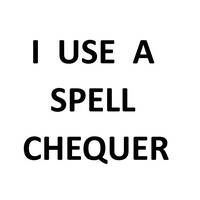 Not Yet Replaced By AI
Not Yet Replaced By AIThis transcription item is now locked to you for editing. To release the lock either Save your changes or Cancel.
This lock will be automatically released after 60 minutes of inactivity.